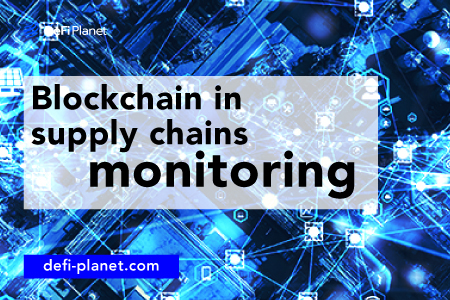Last updated on June 21st, 2023 at 04:49 pm
Blockchain is a revolutionary technology that is built on a distributed ledger, which comes with incredible use cases. This technology which is actively used in the finance realm has also created a new field of finance called, decentralized finance or DeFi. With this innovation, many platforms are offering decentralized lending, yield farming, staking, liquidity pools, exchanges, and similar services. Investors are trooping in daily to diversify their portfolios.
The financial world is not the only sector that has been altered by this distributed storage network. Its ability to publicly validate, record, and distribute transactions in immutable, encrypted ledgers has made it a rockstar in different industries, from the health care sector even down to corporate governance. The supply chain is not left out of the mix.
People love this technology in the supply chain industry because of its transparency and immutability. Its transparency is linked to the fact that the transactions on a blockchain can be viewed by everyone. Users can find out when a wallet address carried out a transaction, and create an on-chain behavioral portfolio for it. With this transparency element, it will be easier for participants in the supply chain to actively track the source of products and their quality.
Immutability stems from the blockchain being unchangeable. Before a transaction is added to a block, it is verified by miners or validators, depending on the type of consensus mechanism that is used. For Proof of Stake chains, they are verified by validators, who are chosen randomly. On the other hand, the Proof of Work consensus system needs a miner to use a massive amount of computing power to verify transactions. Once the gas fees are paid and transactions are verified, they are placed in blocks, which are added to the chain. Every node or most nodes in the blockchain will have access to the ledger of the entire network. These nodes are a network of computers that are distributed all over the globe. If one node misbehaves, it doesn’t affect the functioning of the platform, instead, the node is removed and the validator is penalized. Every network has guidelines to prevent validators from trying to circumvent the operations of the system. One of which is that validators have to invest a large size of funds in a pool before they can be chosen to verify transactions, thereby preventing them from wanting to destroy a platform that holds their funds. Some PoS networks have mechanisms to randomly select validators, meaning that a validator may not know when they will be chosen.
With this immutability feature, it means that it will be almost impossible to alter the data in a blockchain, which is a necessity in the supply chain. Data and records may be falsified to make a fake product seem genuine, and this technology could help nip this in the bud.
The data stored on blockchain are encrypted, meaning that it offers top-notch security features, a feature that every industry needs.
How Will Blockchain Affect Supply Chain?
Once blockchain is incorporated into the supply chain, so many things change;
- Improved tracking
- Reduction of the profitability of counterfeit markets
- Proffers visibility to the manufacturing sector
- Incorporates better storage features
- Heightens trust
• Improved tracking
The supply chain has found its way into the operations of almost every industry. In the medical field, experts need to actively track the production, distribution, and usage of medical tools. They want to actively trace the supply chain of drugs, medical equipment, and hospital facilities to ensure that they were created by approved companies and distributed in a standardized manner. This is also necessary for the food sector.
With the traditional method, it is easier to falsify the records at different points to reflect what the industry wants. Once blockchain is added, data can’t be altered, making it easy to trace the supply chain of products.
• Reduction of the profitability of counterfeit markets
Counterfeit markets survive because they have mastered the act of falsifying products and documents to claim their authenticity. Some unscrupulous elements know that these products are dangerous to their customers, but do not mind as long as they make a profit. As more people buy fake products, counterfeit industries will expand. This also leads to companies and individuals losing funds when they mistake the fake product for the original one. Sometimes, they end up paying the price of the original product for a counterfeit.
With blockchain technology, this is changing, as it lowers losses from counterfeit and gray market trading.
• Proffers visibility to the manufacturing sector
Some companies outsource their manufacturing to other companies thousands of miles away. Many electronic companies in the United States outsource their manufacturing process to other companies, and it may be difficult to ensure that they comply with standards since there are loopholes in the supply chain. With blockchain technology, visibility will be improved, thereby ensuring that outsourced manufacturing follows due process.
• Incorporates better storage features
The traditional supply chain industry is filled with paperwork, which may not be as effective as needed. With paper, it is easy to falsify documentation and claim that products have undergone the right standardized checks when the opposite is the case. With blockchain, the need for paperwork is reduced, making it easy for participants to view information concerning a product from anywhere in the world without leaving their homes. It also cuts down on the administrative costs that come with paperwork and other traditional storage facilities.
• Heightens trust
In some cases, people tend to distrust the data released by a company because there is the belief that the data may have been falsified to put the firm in a good light.
It brings trust because users are aware that the technology is immutable and transparent. If a change is made, everyone will know when the alteration occurred. There is a trail of past activities shown on the network for anyone to view. This improves the credibility of the data.
Blockchain Use Cases in Supply Chain
The use cases of blockchain technology in the supply chain field can be grouped into the following:
• Tracking
As the internet evolves, more people are realizing their rights to determine what they consume. Consumers are now requesting to find out the ingredients or materials used in making the products they consume. Clients are seeking companies with products that have made their supply chain data easy to track and verify.
With this immutable technology, it is easy to track the supply chain and offer clients access to the data they need.
• Transparent structure
A major underlying principle of the network is transparency. Every piece of data that it stores can be accessed by the public, and they can view when it was uploaded. When companies want to update data, they can submit them to third-party validators that validate seamlessly. When there is transparency, it is easy to build trust.
• Tokenization
The supply chain industry can benefit from the tokenization of assets. Non-Fungible Tokens have made it easy for brands and individuals to turn their assets into tokens, which can be traced on the blockchain. For a while, many people feel that NFTs are designed to be used solely in the art world, but that is not the case.
Brands can tokenize an asset like a coupon, ownership of an item, and much more. Tokenizing has opened the business realm to a lot of opportunities, especially in the aspect of an alternative revenue stream.
Brands can create tokens that represent a fractional stake of ownership of an item and sell it to others, without the physical item being exchanged. In the supply chain field, brands may tokenize data and records into NFTs and sell them.
In Conclusion…
- Supply chain is a crucial aspect in almost every industry.
- Blockchain’s transparency and immutability will alter the operations of the supply chain.
- It will reduce the cases of counterfeiting while improving traceability.
- Blockchain will ensure that outsourced manufacturing processes are standardized.
- It is ushering in the new world of tokenization by allowing brands to turn their assets into tokens.





















